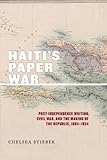Haiti's Paper War : Post-Independence Writing, Civil War, and the Making of the Republic, 1804–1954 / Chelsea Stieber.
Material type: TextSeries: America and the Long 19th Century ; 25Publisher: New York, NY : New York University Press, [2020]Copyright date: ©2020Description: 1 online resource : 11 htsContent type:
TextSeries: America and the Long 19th Century ; 25Publisher: New York, NY : New York University Press, [2020]Copyright date: ©2020Description: 1 online resource : 11 htsContent type: - 9781479802166
- Black people -- Haiti -- Intellectual life -- 19th century
- Blacks-Haiti-Intellectual life-19th century
- Haitian literature -- 19th century -- History and criticism
- Haitian literature-19th century-History and criticism
- Radicalism in literature
- LITERARY CRITICISM / Caribbean & Latin American
- 1789
- Alexandre Pétion
- Caribbean intellectuals
- Dessalinean critique
- Dominican Republic
- Empire
- Faustin Soulouque
- Francophone literature
- François Duvalier
- Haitian independence
- Haitian unification
- Henry Christophe
- Jean-Jacques Dessalines
- Jean-Pierre Boyer
- Liberal party
- Literary magazine
- Louis Joseph Janvier
- Maurrassisme
- National party
- US occupation
- Western episteme
- Western modernity
- allegory
- authoritarianism
- black radicalism
- caricature
- centennial
- civil war
- civilization
- criticism
- cultural nationalism
- fascism
- imperialism
- indigénisme
- liberal Enlightenment
- liberalism
- liberty
- literature
- pamphlet
- paper war
- peasant novel
- performativity
- post-independence Haiti
- post-independence
- postcolonial
- print culture
- refutation
- republicanism
- revolution
- revue
- 840.997294 23
- PQ3948.5.H2 S75 2021
- online - DeGruyter
| Item type | Current library | Call number | URL | Status | Notes | Barcode | |
|---|---|---|---|---|---|---|---|
 eBook
eBook
|
Biblioteca "Angelicum" Pont. Univ. S.Tommaso d'Aquino Nuvola online | online - DeGruyter (Browse shelf(Opens below)) | Online access | Not for loan (Accesso limitato) | Accesso per gli utenti autorizzati / Access for authorized users | (dgr)9781479802166 |
Frontmatter -- Contents -- Note on Translation -- Introduction -- 1 Dessalines’s Empire of Liberty -- 2 Civil War, Guerre de Plume -- 3 Southern Republic of Letters -- 4 The Myth of the Universal Haitian Republic, or Deux Nations dans la Nation -- 5 The Second Empire of Haiti and the Exiled Republic -- 6 Nationals and Liberals, 1904/1906 -- 7 Haiti’s National Revolution -- Epilogue -- Acknowledgments -- Notes -- Bibliography -- Index -- About the Author
restricted access online access with authorization star
http://purl.org/coar/access_right/c_16ec
2021 Outstanding Academic Title, Choice MagazineTurns to the written record to re-examine the building blocks of a nationPicking up where most historians conclude, Chelsea Stieber explores the critical internal challenge to Haiti’s post-independence sovereignty: a civil war between monarchy and republic. What transpired was a war of swords and of pens, waged in newspapers and periodicals, in literature, broadsheets, and fliers. In her analysis of Haitian writing that followed independence, Stieber composes a new literary history of Haiti, that challenges our interpretations of both freedom struggles and the postcolonial. By examining internal dissent during the revolution, Stieber reveals that the very concept of freedom was itself hotly contested in the public sphere, and it was this inherent tension that became the central battleground for the guerre de plume—the paper war—that vied to shape public sentiment and the very idea of Haiti.Stieber’s reading of post-independence Haitian writing reveals key insights into the nature of literature, its relation to freedom and politics, and how fraught and politically loaded the concepts of “literature” and “civilization” really are. The competing ideas of liberté, writing, and civilization at work within postcolonial Haiti have consequences for the way we think about Haiti’s role—as an idea and a discursive interlocutor—in the elaboration of black radicalism and black Atlantic, anticolonial, and decolonial thought. In so doing, Stieber reorders our previously homogeneous view of Haiti, teasing out warring conceptions of the new nation that continued to play out deep into the twentieth century.
Mode of access: Internet via World Wide Web.
In English.
Description based on online resource; title from PDF title page (publisher's Web site, viewed 25. Jun 2024)


